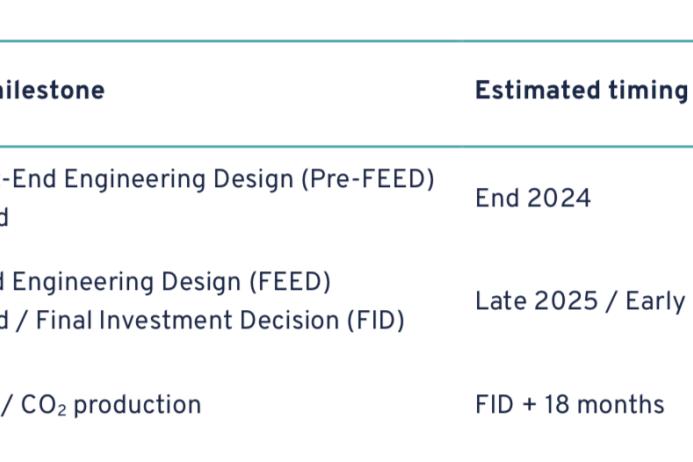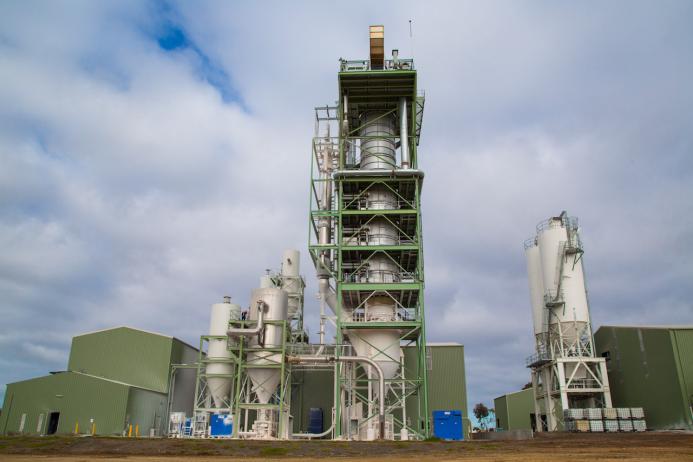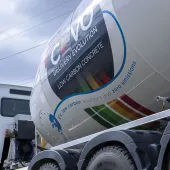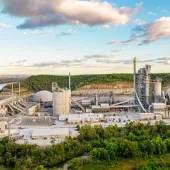Calix awarded A$15m grant for zero-emissions CCU demonstration
Leilac technology to be used to capture 20,000 tonnes of process CO2 emissions per annum
AUSTRALIAN environmental technology company Calix Ltd have been awarded an A$15 million grant from the Australian Government’s Carbon Capture Technologies Program. The grant will support the construction of a world-first renewably powered carbon capture and use (CCU) demonstration plant in South Australia to produce near-zero-emissions lime and supply captured industrial CO2 emissions to the HyGATE-funded Solar Methanol 1 (SM1) project.
The ‘Zero Emissions Intensity Lime and Cement Technology Built in Australia Project’ (ZETA Project) will use an electric and renewably powered version of Leilac technology to efficiently capture unavoidable process CO2 emissions and produce near-zero-emissions lime and cement.
In phase 1 of the project, Leilac technology will be used to produce around 15,000 tonnes per annum of near-zero-emissions lime and capture of up to 20,000 tonnes per annum of high-purity CO2. Calix will collaborate with their partners on the operation and sale of the zero-emissions lime products. Up to 15,000 tonnes of CO2 per year captured by the Leilac technology will be sold to the SM1 project in Port Augusta, South Australia, with any excess captured CO2 available for supply to local industrial CO2 users in South Australia.
In a second phase of the project, the ZETA Project will aim to expand production to include the processing of cement raw meal to a near-zero-emissions cement clinker product, with captured CO2 again supplied for use. By incorporating cement clinkering as an additional process in the Leilac technology, the project aims to develop a novel route to zero-emissions clinker production that reduces cost, energy consumption, and footprint.
The ZETA Project aims to deliver revenue from two streams: a near-zero-emissions lime product and the supply of captured CO2 for use as a chemical feedstock. Calix’s electric calcination technology also enables fast start-up and shutdown, and highly flexible production rates. The ZETA Project aims to leverage this capability to match production to demand and renewable energy costs. Developing this capability is intended to support more cost-effective electric mineral processing and support future grid load-balancing applications.
The ZETA Project’s multiple revenue streams, efficient electric heating, and flexible operations, coupled with the support from the Australian Government’s Carbon Capture Technologies Program, aim to deliver a project with positive economics despite being a first-of-a-kind demonstration.
By capturing and using unavoidable process emissions, the ZETA Project aims to demonstrate innovative pathways to decarbonize multiple hard-to-abate industries.
For industries such as cement and lime, where the majority of emissions are unavoidably released directly from the raw material, cost-effective CCUS is an essential part of the sector’s decarbonization strategy. The use of captured CO2 eliminates the need for CO2 transport and storage infrastructure, and potentially provides an additional revenue source to decarbonization projects. The production of near-zero-emissions lime is also an important enabling capability to produce green metals, particularly near-zero-emissions steel and aluminium.
Using captured CO2 as a feedstock to produce low-carbon fuels can also support the decarbonization of hard-to-abate transport sectors such as aviation and shipping. Green methanol can be synthesized from renewable energy, green hydrogen, and captured industrial CO2. Methanol is a viable low-carbon alternative to diesel for the shipping industry, a pre-cursor for sustainable aviation fuel, and a versatile green hydrogen carrier.
SM1, which aims to develop a world-first methanol production demonstration plant, producing around 7,500 tonnes of methanol per year, is being developed by a consortium of members, including Vast, Mabanaft and Calix, and has been awarded funding of around A$40 million as part of the German-Australian Hydrogen Innovation and Technology Incubator (HyGATE) initiative.
The SM1 project has passed numerous milestones since it was announced, including receipt of planning consent and the formation of a joint development agreement between Vast and Mabanaft.
The ZETA Project aims to develop and demonstrate cost-effective solutions to manufacture sustainable lime, cement, and future fuels, and is being developed in parallel to SM1, with the quantity and timing of CO2 supply targeted to match the demand for methanol production. The material Project milestones for phase 1 are listed in table 1 below.

Calix chief executive officer and managing director Phil Hodgson said: ‘Calix are delighted to have been awarded funding under the Australian Government’s Carbon Capture Technologies Program to produce near-zero emissions lime and cement. This highly innovative project aims to demonstrate solutions for several national priorities identified in the Australian Government’s Future Made in Australia programme.
‘Calix’s renewably powered technology platform can electrify mineral processing and capture unavoidable emissions to enable carbon-intensive industries like cement and lime to reach net zero. Zero-emissions lime will also be an important enabling material for the development of an Australian green metals industry for green steel and aluminium.
‘Additionally, by combining captured CO2 with Australian sunshine in collaboration with our partners in the SM1 project, we aim to demonstrate a low-cost decarbonization pathway for cement and lime and a novel way to make low-carbon transport fuels.
‘It is exciting to see Australian technology companies, supported by Australian Government funding, collaborating to take advantage of the unique comparative advantages Australia can have in a decarbonizing global economy.’
Vast chief executive officer Craig Wood commented: ‘We are delighted to be partnering with Calix on SM1, using CO2 captured from their near-zero-emissions lime plant to produce green methanol to decarbonize the maritime sector. It is excellent to see the Australian Government supporting companies like Vast and Calix as we develop solutions to decarbonize shipping and aviation globally.
‘Coming against the backdrop of the Australian Government’s Future Made in Australia programme, which aims in part to unlock a domestic renewable liquid fuels manufacturing industry, there is real momentum for Australia to become a world leader in this space.’
Mabanaft’s director of new energy, Philipp Kroepels, added: ‘We believe that government support, such as that provided by Australia and Germany through the HyGATE initiative, is essential to stimulate development of low-carbon, sustainable fuels, including methanol. Our joint project with Calix and Vast will certainly take us forward in developing viable solutions for decarbonization.’










